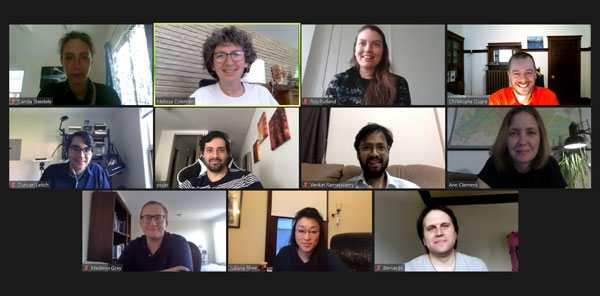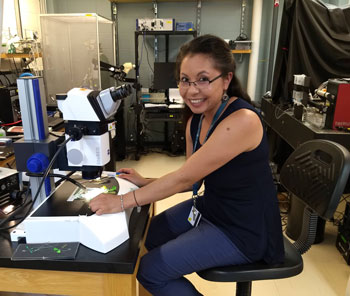The 2020 Grass Fellows “Arrive,” with Research Discoveries to Follow

Octopus, turtles, ticks and even alligators: The 2020 Grass Fellows plan to study the nervous system in an adventurous range of organisms!
Each year, coveted Grass Fellowships are awarded to outstanding, early-career investigators in neuroscience by the Grass Foundation. Typically, the fellows spend 14 weeks at the Marine Biological Laboratory (MBL) during the summer months, where they have an unparalleled opportunity to develop a research project of their own design and “find their legs” as independent investigators.
 The first online meeting of the 2020 Grass Lab spanned several nations and time zones. One fellow joined at 2:30 AM from India!
The first online meeting of the 2020 Grass Lab spanned several nations and time zones. One fellow joined at 2:30 AM from India!But this will not be a typical summer at the MBL, as all courses and programs are cancelled due the COVID-19 pandemic. This year’s Grass Fellows have been offered the option to defer their fellowship until 2021 or 2022. Then, they will come to beautiful Woods Hole and have the full Grass Lab experience: sharing a dedicated laboratory in the MBL’s Rowe Building, using top-flight lab equipment and software, receiving guidance from superb faculty mentors, and developing lasting bonds and collaborations within the extraordinary scientific community at the MBL.
"A Grass fellowship is a wonderful opportunity to conduct independent research before going out in the job market,” says Steven J. Zottoli of Williams College, a Grass Foundation trustee. "You not only have to assemble your [experimental] equipment but you need to overcome the challenges inherent in conducting an original research project. Meanwhile, you have the support of the program’s directors and other fellows facing similar challenges, as well as all the resources that the MBL brings."
 2019 Grass Fellow Alejandra Gonzalez Gonzalez in the Grass Lab at MBL. Credit: Melissa Coleman
2019 Grass Fellow Alejandra Gonzalez Gonzalez in the Grass Lab at MBL. Credit: Melissa ColemanUntil the time that the 2020 fellows can land on the ground in Woods Hole, they are getting oriented through online meetings organized by Grass Lab Director Melissa Coleman and Associate Director Christophe Dupre.
"What a fun group!" Coleman said after the fellows' first Zoom meeting this week. “We plan to have regular 'lab meetings' this summer in which fellows will talk about their current research. In addition, the fellows will invite speakers to give regular seminars. We also hope to have some social online gatherings. Someone has suggested a virtual margarita party using Ed Kravitz’s recipe!” Kravitz is a legendary neurobiologist at Harvard University and a long-time lecturer in the Grass Lab.
Grass Fellows enter the program at a critical phase in their careers – usually postdoctoral level. The program successfully develops their skills as independent investigators who can go on to make important contributions to neuroscience, reported a 2013 review of the program in Neuron.
"The science is very important but it is the overall experience of being in the vibrant MBL community that is critical to the success of the program," Zottoli says. "This exposure allows each fellow to grow and prosper and to move on in their career."
More about the 2020 Grass Fellows and their planned research projects is here.
Additional Grass Lab applications will be accepted for the next two years; details will be posted this fall on the Grass Foundation website.